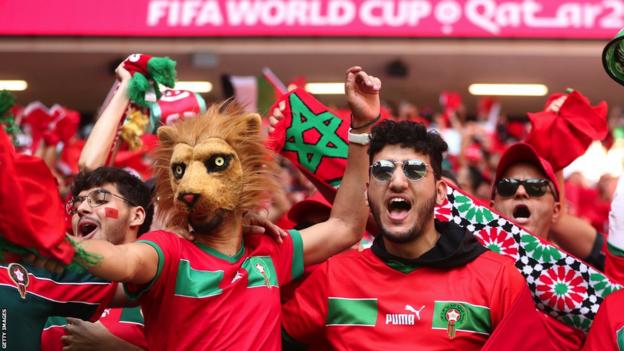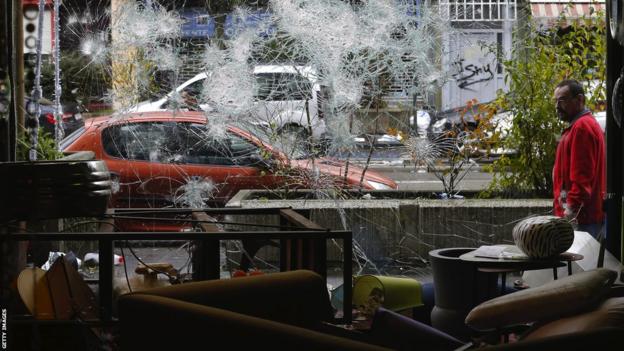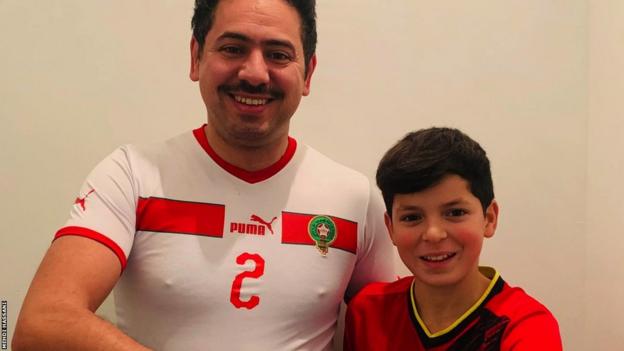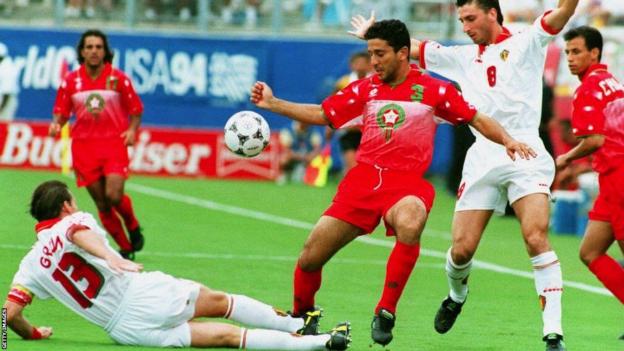
| Host nation: Qatar Dates: 20 November-18 December Coverage: Live on BBC TV, BBC iPlayer, BBC Radio 5 Live, BBC World Service, BBC Sounds and the BBC Sport website and app. Day-by-day TV listings – Full coverage details |
Questions of cultural identity and split loyalties among the huge Moroccan community in Belgium will arise when the two countries meet in Group F at the World Cup on Sunday.
People from the North African country form one of the largest migrant groups in Belgium, with strong links established in the 1960s when Moroccans flocked to the country responding to the demand for miners and workers in other industries.
The Moroccan community in Belgium kept growing and is now estimated to be between 400,000 and half a million strong.
It will be the second time the two nations have faced each other in the tournament’s history after the Europeans beat the Atlas Lions 1-0 in 1994 thanks to a first-half header from Marc Degryse.
On that occasion, it was the first of three defeats and resulted in a group-stage exit for Morocco, who also failed to reach the knock-out stages on their past two World Cup finals appearances in 1998 and 2018.
Tensions were heightened five years ago when more than 20 police officers were injured in Brussels after celebrations following Morocco’s qualification for Russia 2018 turned violent, and Sunday’s match at the Al Thumama Stadium in Qatar could provide another flash point.
“I will watch this match from an identity point of view,” Mounim Bennis, a 40-year-old accountant living in Brussels of mixed Belgian-Moroccan origin, told BBC Sport Africa.
“It’s a match very close to my heart. When you are in Belgium you are considered a foreigner, when you go to Morocco you are considered a foreigner as well!
“It’s symbolic. It is very rare that Morocco participates in the World Cup [compared] to Belgium. It’s the sixth time that Morocco goes, Belgium usually goes almost all the time, so I will support Morocco.”
Institutional barriers

Such is the size of the Moroccan diaspora in Belgium, there are several footballing ties between the countries.
In the Morocco squad, Ilias Chair, Anass Zaroury, Selim Amallah and Bilal El Khannous all have roots in Belgium – with the latter two players plying their trade with Standard Liege and Genk respectively in the Belgian league.
Off the pitch, Chris Van Puyvelde, a technical director with the Belgian football association (KBVB) between 2015 and 2018, is serving in the same role with the Moroccan federation (FRMF).
Yet Bennis thinks players of Moroccan heritage face institutional barriers in Belgium.
“As a supporter of both Morocco and Belgium, I find that there are not enough Moroccans in the Belgian league,” said Bennis.
“It is because of the lack of opportunities. There is racism.
“It is not normal as in the Netherlands, where there is a Moroccan community like ours, there are a lot more Moroccans than in Belgium. Yet in every Dutch club, there are two to three players with Moroccan roots.
“You have to change the mentality of the recruiters. You see an enormous amount of players with Moroccan origins at youth level in the Belgian clubs but at the time of professionalisation – when the first team comes – there is a categorical refusal to advance the career of these young players.”
Integration in the Netherlands

Mehdi Hassani, a butcher from Brussels and season ticket holder at Anderlecht. argues there is “not enough diversity” among youth coaches in Belgium.
“El Khannous was ignored by Anderlecht to progress to the first team,” he added.
El Khannous featured for Belgium’s national youth teams but played his first senior international for Morocco in September, against Belgium no less.
Zaroury, meanwhile, helped Belgium qualify for the Under-21 European Championship, but the Burnley winger switched allegiance to Morocco on the eve of the tournament in Qatar.
“When there is a good player, you have to receive and guide him well,” said Michel Sablon, a former KBVB technical director.
“You can’t lose them. You have to open the door to talented players to integrate them into the youth development system, which has to benefit the national team.”
Sablon says lessons on integration can be taken from their neighbours to the north,namely the Netherlands.
“It is a cultural phenomenon,” Sablon added.
“The Netherlands is much more open in this respect. They have a long history with Indonesia. They are open more open to integration, both in football and in society.
“That’s more difficult in Belgium. There is more aversion, but those players carry the cultural consequences of a group that is identified as Moroccan and not entirely integrated into society.”
Belgium’s World Cup squad this year does not include any players with Moroccan roots, given that coach Roberto Martinez left out former Tottenham winger Nacer Chadli.
Meanwhile, Marouane Fellaini, the former Manchester United midfielder born to parents from Tangier, retired from the national team in 2019.
As a consequence, Bennis and Hassani identify far less with Belgium and will hope that Morocco can get a good result against Martinez’s team to remain competitive in Group F, having begun their campaign with a 0-0 draw against 2018 runners-up Croatia while Belgium overcame Canada 1-0.
Authorities in Belgium, meanwhile, will be looking to avoid a repeat of the potential clashes between Moroccan fans and police on the streets of the country – be it in Brussels or elsewhere.


Get the latest results and goal notifications for any team at the Fifa World Cup by downloading the BBC Sport app: Apple – Android – Amazon


Get your daily dose of Fifa World Cup reaction, debate & analysis with World Cup Daily on BBC Sounds

